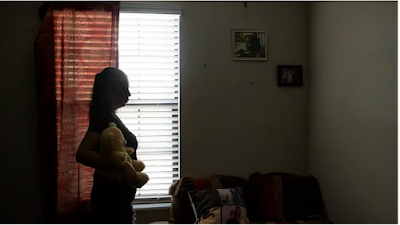By Hannah Critchfield
The smell hit Nicole Santos before she’d finished stepping into the hospital room.
Nurses surrounded her mother, she said, stripping bandages from her backside.
They revealed a cavernous bedsore. Through the mouth of the wound, Santos said, she could see bone.
Santos said her mother, Maritza Jackson, 59, had only been living at A Place to Grow, a Brandon assisted living facility, for two months. Though she had Alzheimer’s, she’d been physically healthy. Now, her mother was declining rapidly. An emergency room doctor told her there was nothing they could do, she said.
Last month, A Place to Grow was ordered to pay $12.5 million in damages in a wrongful death lawsuit filed by Santos early last year. The complaint, filed in Hillsborough County, alleged that the facility was understaffed and negligent in caring for her mother, causing a preventable injury that led to her death.
It may be the largest judgment awarded by a jury in a case involving a Florida assisted living facility, according to online legal research records.
“It sends a message to the assisted living facility industry in Florida,” said Michael Brevda, an attorney at Senior Justice Law Firm and one of Santos’ lawyers in the wrongful death suit. “Juries will get just as mad at an assisted living facility as they will a nursing home corporation.”
Enrique Toledo, the manager of the company that ran A Place to Grow, could not be reached for comment. He did not retain counsel during the lawsuit, and an attorney representing him in a separate criminal case did not respond to requests for comment. The Tampa Bay Times reviewed a photo of Jackson’s bedsore, which was also admitted as evidence during the wrongful death trial.
Assisted living facilities tend to provide less complex medical care than nursing homes. They’re part of the state’s goal to promote services for older people in the “least restrictive and most homelike environment,” according to laws governing these facilities.
For many, these facilities are considered an attractive option for loved ones who have cognitive problems and require more supervision than family members can provide at home. Memory care services have also become assisted living facilities’ greatest liability, experts say.
“The training that staff need is very different than for someone with just physical issues,” said Carrie Blakeway Amero, director at the AARP Public Policy Institute. “People with dementia might just wait until someone comes to tell them that it’s breakfast time, or in the morning, they may not get up until someone comes to help them orient themselves. Staff need to be aware of how to cue people.”
Santos’ mother was a fiery woman who would hop on her feet at the first notes of a Marc Anthony song.
“She could not dance salsa,” Santos remembered with a laugh. “She had one move. But she loved it. And she was funny — don’t get a little bit of chardonnay in her, forget about it.”
A few years back, Jackson began to seem confused during the evenings. She was eventually diagnosed with Alzheimer’s, moving into her daughter’s Wimauma home.
“I fought it, but her doctors kept insisting, ‘You’re going to have to put her in a facility for her safety,’” Santos said. “And we did, because at one point, we had to actually put a lock on the inside of the house because she kept trying to get out.”
An acquaintance recommended A Place to Grow, a small assisted living facility a few miles from Santos’ work. Jackson began living there in May 2021.
Santos visited her mother daily, she said. To her relief, Jackson seemed happy.
That July, Santos said she got a call from a doctor, saying that her mother had pneumonia and a severe pressure ulcer and needed to go to the emergency room immediately.
Jackson died a few days later of sepsis due to those conditions, according to her death certificate. A “failure to thrive” due to Alzheimer’s disease was listed as an additional cause.
In July of last year, one of the defendants and managers of the limited liability company that owned A Place to Grow, Toledo, 53, was charged with the first-degree murder of his wife, who at the time was also named in Santos’ lawsuit.
Toledo did not attend the trial in the wrongful death case or respond to several court mailings ahead of the proceedings, county records show.
The judge presiding over the case eventually issued a default judgment against A Place to Grow LLC and Toledo, meaning all allegations in Santos’ lawsuit should be “deemed true,” according to court filings. The jury merely had to decide how much money to award the Santos family.
Because of Toledo’s absence, it isn’t clear how much money the family will be able to recover, Brevda said.
“I’m not in it for the money,” Santos said. “I just wanted to get justice for my mom. To me, justice has been served — I just didn’t want this to happen to someone else.”
A Place to Grow closed in September, according to Agency for Health Care Administration records.
Full Article & Source:
Florida assisted living home must pay $12.5M after woman’s death


No comments:
Post a Comment